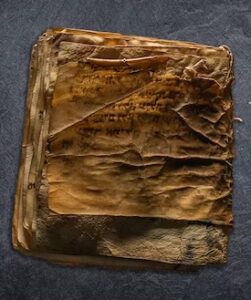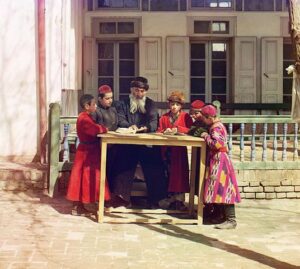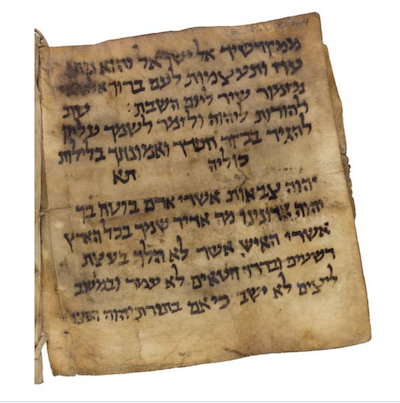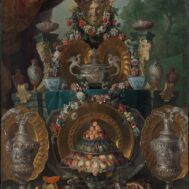AFGHANISTAN – World News Bites
“You have captured my heart and will be safely protected.”
From a poem for Sukkot in the Afghan Liturgical Quire

Afghanistan Liturgical Quire, courtesy Museum of the Bible, Washington, DC.
A new Museum of the Bible (MOTB) exhibition centers around a remarkable object, the Afghan Liturgical Quire (ALQ), a rare Jewish bound book that offers a glimpse into the religious and cultural diversity of ancient Afghanistan. The ALQ is a symbol of the enduring Jewish presence in the region and the collaborative efforts that saved it from destruction.
The Afghan Liturgical Quire is a small (5”x5”) book containing a collection of Hebrew liturgical texts, including prayers, blessings, and poetry still recited by Jewish communities today. Among its contents are Sabbath morning prayers, a Haggadah (interestingly placed upside down), and special blessings for the Jewish holiday of Sukkot. This codex is believed to have been in use for centuries, passed down by Jewish communities far from the traditional centers of Jewish life. The manuscript contains diverse elements in Hebrew, Aramaic and Judeo-Persian script.
The ALQ dates to the 700s CE, making it the oldest known complete Hebrew manuscript in book form — predating other manuscripts by over a century. It was initially misrepresented as part of the Cairo Genizah, but MOTB scholar Herschel A. Hepler unearthed photographic evidence linking the ALQ to Afghanistan. Further meticulous research revealed that it had been found in Bamiyan by a Hazara man, part of Afghanistan’s persecuted Shi’a minority. The Hazara family safeguarded the manuscript as a sacred object for years, until it was eventually taken out of the country in 2001.
The museum enlisted the scholar Malachi Beit-Arié for additional analysis and followed through when Beit-Arié insisted on separate radiometric analyses of four section of the book, revealing its latest date of 780, when a solar event left a recognizable hard line in its scientific dating chronology.

Jewish children with their teacher in Samarkand. Sergei Mikhailovich Prokudin-Gorskii documented the Russian Empire from 1909 to 1915 using a color photography technique he developed. For centuries, there has been frequent interchange and movement of Jewish communities between Afghanistan, Iran, and Central Asia. Collection of US Library of Congress.
The Museum of the Bible officially acquired the Afghan Liturgical Quire in 2014, after it was donated by Hobby Lobby, which purchased the manuscript the previous year. Recognizing its responsibility as a cultural custodian, the MOTB proactively engaged with Afghan Jewish diaspora communities and the former Afghan government to protect the ALQ as part of Afghanistan’s rich cultural heritage.
The American Sephardi Federation issued a statement regarding the exhibition: “Were it not for the extraordinary efforts of the Museum of the Bible, the age and even the origins of the world’s oldest Jewish book would have been forever lost.”
The MOTB states that it regards itself as custodian for the quire and committed to preserving the manuscript’s legacy. Its partnership with the former government of Afghanistan reflects the Museum’s dedication to a human rights-based approach in cultural heritage management. The Museum continues to work with appropriate officials and Jewish communities to ensure that the ALQ remains a link to the displaced Afghan Jewish community. Afghanistan was once a land of religious and ethnic diversity, home at various times to co-existing communities of Buddhists, Nestorian Christians, Manichaeans, Muslims and Jews. The exhibition illustrates that diverse history, highlighting the ancient roots of a now-displaced Jewish community.
Exhibition: “Sacred Words: Revealing the Earliest Hebrew Book,”
Museum of the Bible, Washington D.C., September 24, 2024 through January 12, 2025
 A page from the Afghanistan liturgical quire, 5x5 inches bound book, 7th-8th century, courtesy Museum of the Bible, Washington, DC.
A page from the Afghanistan liturgical quire, 5x5 inches bound book, 7th-8th century, courtesy Museum of the Bible, Washington, DC. 

